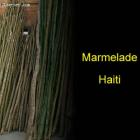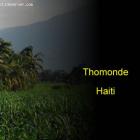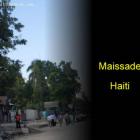ADVERTISEMENT
Religion - Haiti Observer Blog
Religion, Haiti Observer Blog. Read the following articles about Religion
Francois-Wolff Ligonde, who presided over Duvalier- Bennett wedding is Dead
An ardent supporter of the Duvalier regime, Haitian Bishop Francois-Wolff Ligonde passed away. According to Radio Kiskeya based on information obtained from Bishop Louis Kebreau, he died following an unspecified illness.
Bishop Francois-Wolff Ligonde was born in the city of Les Cayes, on January 17, 1928. On August 20, 1966, Pope Paul VI nominated him as Archbishop of Port-au-Prince. After more than 40 years in this position, Bishop Francois-Wolff Ligonde retired from his post in 2008.
Bishop Francois-Wolff Ligonde became famous when he presided over the wedding of Jean Claude Duvalier and Michele Bennett, whom he is the uncle. The wedding that many people believe marked the beginning of the end of the regime. There were several issues on the table with this particular wedding: One, Michele Bennett, a mulatto who came opposed to the Noirisme movement that Francois Duvalier has been promoting throughout his government. Two, the wedding itself in 1980 cost over $5 millioms.
Haiti Constitution of 1807
Title I. Abolishes slavery, grants residents full citizenship rights, protects property, and administers the death penalty for murder.
Title II. Sets up organization of government, appointing Henry Christophe President and Commander-in-Chief of the military. Empowers him to appoint his successor, sign treaties, and declare war.
Title III. Establishes Council of State and its functions under the President. Creates an Office of the Budget, presided over by a Budget Finance Director.
Title IV. Budget Finance Director shall also handle administration of Navy and Interior.
Title V. Creates a Secretary of State responsible for all intra- and inter-departmental correspondence, preparation of official government documents, and co-signatory duties.
1801 Constitution of Saint-Domingue, Haiti
The Constitution of Saint-Domingue Haiti was signed in 1801 by Governor-General for Life Toussaint L'Ouverture, the ruler of Hispaniola before Haiti became a republic.
Title I. Refers to the colony of Saint-Domingue, the seat of cities and neighboring islands, subject to French rule. Sets up the divisions of departments, arrondissements, and parishes.
Title II. Abolishes slavery, introduces anti-discrimination rules, and employment rights.
Title III. Establishes Christianity as the official religion of the colony. Forbids men of God from organizing for political reasons.
Title IV. Protects the legal rights of spouses as long as they remain faithful and their children born of their sanctified or civil union.
New Pope Francis, Cardinal Jorge Mario Bergoglio Of Buenos Aires
The Catholic cardinals picked a new pope among themselves on Wednesday, March 13, 2013. He is Cardinal Jorge Mario Bergoglio. The new pope,Jorge Mario Bergoglio, 76, will be called Francis, the 266th pontiff of the Roman Catholic Church.
New Pope Jorge Mario Bergoglio' s First Pray 13.03.2013
White Smoke Rises Over Vatican, the Catholic Church has made history. The New Pope is the first non-European leader of the church in more than 1,000 years.
Who is Cardinal Jorge Mario Bergoglio?
Coteaux and the Miraculous Virgin
The town of Coteaux is the capital of the Arrondisement of Coteaux in Haiti's Sud Department. However, it is not the only reason why many people throng to the town every now and then. A high number of believers often go to the town in order to pray to the Miraculous Virgin in Coteaux.
It is believed that the Virgin hears and grants the prayers of believers, especially women. In order to reach the shrine where the Miraculous Virgin can be found, people have to pay a pilgrimage and climb a 500-step stair. Going to the shrine through the long stair is almost the same as scaling the popular Great Wall of China.
Legal Expert Says 2011 Constitution Does Not Endanger Voodoo Faith
An on-going debate over whether the practice of voodoo is being threatened by the amended 1987 Constitution has stirred the embers of its practitioners' fears.
Voodoo, brought to Haiti by Congolese slaves, became entrenched in Haitian culture, early in its history.
In 1935, under the rule of Stenio Vincent, the 1935 Decree Law defined voodoo as a superstitious belief system and banned the practice of it. For over 50 years, the Decree Law was not tampered with. By 1987, though, the amended Constitution struck down the Decree Law with Article 297, invalidating the definition of voodoo as a superstitious practice. A presidential decree on April 4, 2003, further legitimized the voodoo faith. But in May 2011, Article 297 was annulled, and has given rise to fears that voodooists would suffer persecution for their beliefs.
President Michel Joseph Martelly met Pope Benedict XVI - VIDEO
On November 22, 2012, Haitian president Michel Martelly and family met Pope Benedict XVI in Rome.
Martelly also met the Vatican's Secretary of State, Cardinal Bertone where the Vatican agreed to continue to support Haiti to recover from the 2010 earthquake.
Video of Haitian president thanks Pope for quake aid during Vatican visit:
For me the "Haitian Joudalist", it was important to notice two important facts from the meeting between President Michel Martelly and Pope Benedict XVI.
- One, If you look closely, you will see the Haitian President with his "Pink Bracelet" visibly displayed during the meeting.
Haitian After Life Belief
In Haiti, religion is professed by almost all Haitians.
Religious demographics in Haiti are distributed as follows in the Haitian population: Roman Catholic 80%, Protestant 16% (Baptist 10%, Pentecostal 4%, Adventist 1%, other 1%), none 1%, other 3%.
Haitian Catholics, Baptists, Protestants and other Christians accept as true the existence of heaven, hell and purgatory; that the fate of the departed depends on how he lived his life on Earth. They believe in the teaching of the Catholic Church's teachings which holds that people who led a good life tend to go to Heaven, where they will be with God, angels, departed relatives, and fellow believers.
Islam Experiencing a Renewal in Haiti
When Haiti's 2010 earthquake hit, it shattered the infrastructure of the country. Thousands of people lost their homes, ending up in tent cities beyond the borders of Port-au-Prince. Survivors of the quake were left, not only without shelter, but without food or water. Although relief aid poured in from all over the world, logistics prevented it from reaching the quake survivors quickly. Because of this, the religion of Islam won new converts, for they were able to offer shelter in the mosques and food.
One of the disaster relief agencies, Islamic Relief USA, arrived in Port-au-Prince and erected 200 shelters, later building a 20-classroom high school. Imam Robert Dupuy says the five mosques located on the island were able to house many hundreds of people. As a result, Islam has experienced more conversions.
Pierre Toussaint, Beatified candidate for sainthood
Pierre Toussaint is one of the few people all over the world to have led a holy life as described by the Roman Catholic Church. He lived in New York where he was a slave to his masters and where he began his life. He led a simple life here and was a hair dresser for quite some time. When his master died he was left with the widow whom he took care of with the money he received from his hair dressing activities.
However she too died leaving Pierre Toussaint free. He then took on his life and established an orphanage for the disabled and the Haitian refugees that used to come there seeking for a better life or escaping the harsh conditions at home. He took it upon himself to take care of them such that eventually he became the official responsible for all the immigrants.
Our objective is to share with you news and information about Haiti and the people of Haiti. Traditions, habits and the way we were or grew are alive in this site. We highly recommend that you Subscribe to our Newsletter and also share with us some of the things that are memorable and made us unique people.


 Marmelade, Haiti
Marmelade, Haiti  Thomonde, Haiti
Thomonde, Haiti  Haiti tech Summit
Haiti tech Summit  Black Friday Shopping Season
Black Friday Shopping Season  Maissade, Haiti
Maissade, Haiti